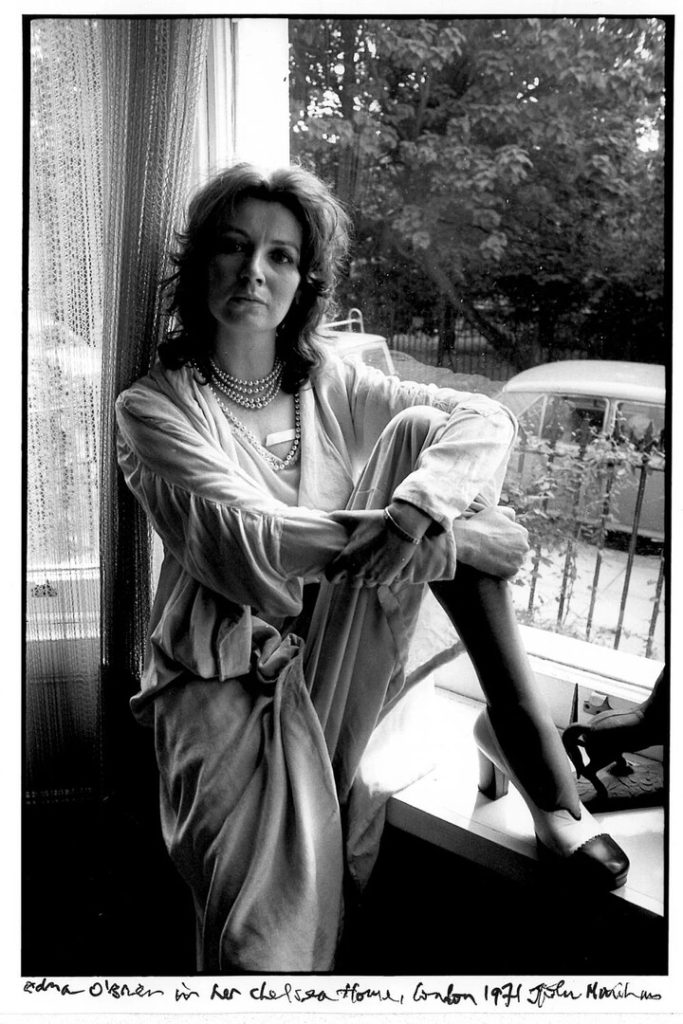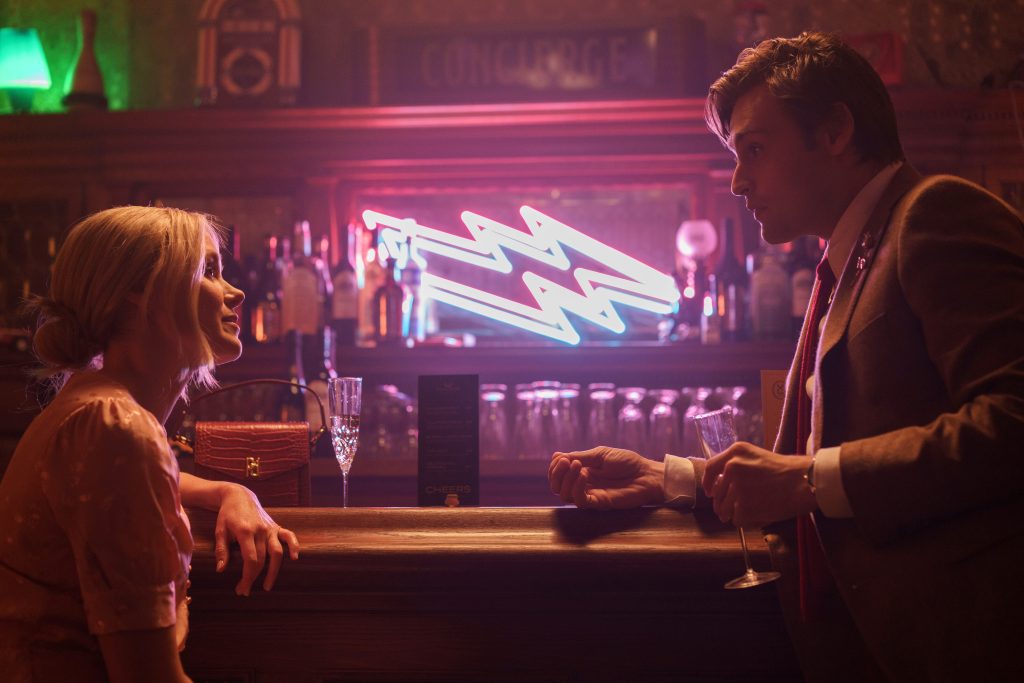





By Anne Brodie
Azazel Jacob’s Netflix’s His Three Daughters concerns three estranged daughters (Natasha Lyonne, Elizabeth Olsen, and Carrie Coon) who gather to watch over their dying, beloved father Vinny (Jay O. Sanders). Coon’s Katie, the eldest daughter is always angry, and Olsen’s Christina, is her handmaiden. And their stepsister Rachel (Lyonne) is the black sheep who smokes a lot of drugs. She has been caring for their father for a long while, the sisters don’t give her any credit, come into the apartment she shares with Vinny and take over, handing out orders and taking charge and neither had bothered to visit Vinny when he became ill. I was deeply moved, enlightened, intellectually and psychologically stimulated, and glad to have seen it. Jacob created a magical blend of realism and an unexpected, heightened human fantasy co-existing as they naturally do in life. The drama fantasy unfolds beautifully, elegantly, and in a lifelike manner with performances that are rich, outstanding, award-worthy and unforgettable. “Death is absence, everything else is fantasy…”.
The Tragically Hip: No Dress Rehearsal. Spent four hours in a theatre quietly weeping remembering, celebrating, and reliving our precious time with The Tragically Hip watching a heart swelling documentary from Gord Downie’s brother Mike. It is stunning. You know going in it will be powerful but a firehose of emotion hits really hard. Four hours fly by like a flock of Canadian geese; it’s a vivid and intimate portrait of the band’s history, surviving members’ memories, and the phenomenon that was Gord Downie, artist. Their thirteen albums’ birth and development are painstakingly captured through extensive archival footage and interviews with both Downies, Rob Baker, Johnny Fay, Paul Langlois and Gord Sinclair. Boy, we were lucky in Canada to have had it all, this collective musical force so pure in its identity that it’s become a score of our lives. What haunts me still is that voice and the feelings it stirred and stirs. A superior and important doc. TIFF Sept. 5, 12, 17 and streaming on Prime Video Sept. 20. www.tiff.net
Melanie Oates’ dark shocker set in a small coastal town in Newfoundland looks at ways women’s sexuality and identity have been squelched for millennia. Think of the witch murders over the centuries and fold that thought. Sweet Angel Baby making its World Premiere in Centrepiece TIFF Next Wave Program Sept 9 and screening Sept 10 is about repression, reprisal, old-world values and how they destroy. Michaela Kurimsky’s Eliza is a heroine, beautiful, a free spirit who lives alone and manages her harsh existence atop a rocky cliff. Capable, smart, and tied to the weather, nature and community, she has a secret pastime posing naked in the woods wearing a mask; she posts on social media and so far, no locals have caught on. She’s well-liked, a strong supporter of the local church organising a fundraiser to stop its sale, of people in need, and always ready to participate in community life. Her secret lover Toni (Elle-Máijá Tailfeathers) isn’t an islander, therefore an outsider; even she is unaware of Eliza’s self-portraits. Eliza must rebuff men who try to seduce her, she believes that all they see is her face and body. A local married men finally recognises her online, makes a play for her and things take a terrible turn. They sleep together, his wife finds out and the entire community attacks on two counts – seduction and her posts. Set in modern times, Oates’ incredibly powerful film raises spectres of historic violent prejudice against sexualised women. This woman who has done so much for those around her, is shunned and hurt, raising complex questions about what it means to live in an isolated community as a scapegoat. Oates makes us wonder how far we’ve come since the 1500s.
Sinéad O’Shea’s provocative documentary on one of Ireland’s greatest, barrier-destroying authors, Blue Road – The Edna O’Brien Story will leave you breathless.O’Brien, who died in July at 93 rebelled against everything she knew, growing up poor, rural in a strict, unyielding and abusive environment and she triumphed. She wrote novels, memoirs, plays, poetry and short-story writer and burst forth globally, rejecting the values of her parents and of the times. O’Brien’s works concerned women being “utterly” honest, themselves, stepping out of societal and familial repression. They were sexually explicit (rumours that clergy burned her books) and reflected intense independence. Sadly, she married into an abusive relationship with fellow Irish writer Ernest Gébler who was jealous of her success. Rich with archival footage, O’Shea’s thoroughly engrossing work starts with the starry stuff, O’Brien’s relationships with Richard Burton, Sean Connery, Judy Garland, Robert Mitchum, Marlon Brando, Paul McCartney, Shirley MacLaine, Marianne Faithfull, Roger Vadim and Jane Fonda staying with her. She says “I knew it was transitory” referring to her celebrity life in London. O’Brien’s interviews just before her death and astounding and revelatory. A must-see. TIFF Sept. 8.

I wonder what Goethe would think of José Lourenço’s Young Werther, an odd, whimsical adaptation of the German writer’s first novel, the 1774 tragic romance.Johann Wolfgang von Goethe is a renowned polymath – poet, playwright, novelist, scientist, statesman, theatre director, and critic – he might have scratched his head and we also wonder what he’d think of present-day Toronto, plainly identifiable as tits wonderful unique self. Douglas Booth and Alison Pill are Werther and Charlotte and they’ve begun an illicit flirtation. She’s getting married but “neglects” to tell him even as he has fallen in love with her. Charlotte’s clearly into him and they become close; he has hope. Hence his sense of deep betrayal and anguish on learning the truth. He knows she’s a little in love with him, maybe a lot. We the audience, cheer them on, knowing something’s got to give and that it won’t be pretty. Her sister Sissy (Iris Apatow) has a crush on Werther adding to the weight these two will carry in their wobbly and questionable love side hustle. Charlotte’s fiancé Albert (Patrick J. Adams) remains confident she won’t stray and tolerates their intense friendship, see? He’s patient and understanding. Plenty lies ahead. The film’s whimsical, brightly coloured, eccentricity in the vein of Wes Anderson is successful at times and over-eager at times. Werther is appealing and occasionally bumptious, determined to win her for himself, whatever the cost. Will it cost what it cost Goethe’s hero? Sept 11 TIFF.

The National Film Board of Canada (NFB) has consistently produced stellar, important films, recognised as some of the world’s best, since its founding days as The Exhibits and Publicity Bureau in 1918, and in 1923 the Canadian Government Motion Picture Bureau and as it is now, in 1939. The NFB, an annual presence at TIFF, offers animation, features, shorts and documentaries. Two excellent examples will debut at #TIFF24. The animated short Inkwo for When the Starving Return by stop-motion animator Michif/Métis Amanda Strong, is an arresting work rooted in millennia of indigenous existence. Dove (Paulina Alexis) is an Indigenous child who “isn’t attached” to gender, and their mother cross a frozen sea in a blizzard when they hear the ice crack – meaning imminent death as it breaks. Mother tells Dove to run as she gives herself up to the sea. Dove has visions of a fractured world of greed, inhumanity and a declining environment – all man-made – and fears the monsters we created will rise up from under the ground and destroy humanity. They need medicine but it is gone. Auntie (Tantoo Cardinal) appears to tell them not to worry – that the walrus and caribou – protectors of the water and land – will save the world and they will be a warrior. Based on Richard Van Camp’s story. It is a long review on a short film because it is glorious. Sept 7 and 12.
https://www.tiff.net/events/short-cuts-2024-programme-03

The docmentary So Surreal: Behind the Masks from Neil Diamond and Joanne Robertson is an eye opener, a documentary on ages-old Indigenous art, theft, recovery hope and healing. Yupʼik and Kwakwa̱ka̱ʼwakw ceremonial masks, created for Potlatch ceremonies have deep meaning. They represent millennia-old expressions of life. We learn that they are worn to explain what shamans see on the other side during sacred dances, made by hand but created by the spirit world speaking through them. After use by “dancers and dreamers” they were burned or dropped on the tundra to decompose. “They don’t belong to us; they belong to the spirit world”. In 1921 the Canadian government banned Potlach and the regalia, items were seized in true colonial style, and Europeans began to collect them. The French Surrealists adopted and collected the masks as they “understood” them, which only made them more collectible. Today, some hang in museums including the Louvre but the vast majority are hidden from view in private hands. Owners have refused to respond to requests to return them or speak to Diamond, so he hired a detective to locate them. Meanwhile, Alert Bay’s U’mista Cultural Centre continues to work tirelessly to restore the masks to their rightful home. Diamond’s doc feels like a thriller with rare footage, including a Potlach ceremony with a brief glimpse of a Raven transformational mask opening in all its glory. World Premiere TIFF Sept. 10 and screens Sept. 12
One episode and I’mhooked. I’m not normally the soap type, but The Perfect Couple on Netflix is high-end soapy to its bones yet manages to fold in psychological complexity and subtlety, steeped in the closed-space murder mystery. And what a space – an oceanside Nantucket home, playground for the uber-rich Winburys, with its fabulous mansion and ocean shores, where only the upper crust meet. Nicole Kidman’s Greer Garrison Winbury, a bestselling mystery writer, matron and wife of unflappable Tag (Liev Schreiber) are about to host their son Benji’s (Billy Howle) wedding to Amelia’s (Eve Hewson). Admittedly she’s not of their class, but the kids are in love and not to be discouraged, to Greer’s dismay. The family maid is deeply insulted when Amelia washes her own dishes and says things about her employers like “without fear, there can be no control”. Amelia comes outside in her bra. Not done! A jeweller asks Greer if she likes the bracelet her husband gave her; she’s taken off guard and says yes, and sees his receipt for an extremely expensive bangle he hasn’t given her. She tells Benji the morning he is to be married, that marriage “isn’t really worth it in the long term”. And a body is found in the shallow waters. Oops. Disturbing currents run in and about the family bringing them into sharp focus, a corker as it bobs in and around the water and imagination. Streaming now.
The Sopranos fans, rejoice. A worthy documentary on the groundbreaking, unmatched series is coming to HBO Max on Sept. 7. Alex Gibney’s two-parter Wise Guy David Chase and The Sopranos brings back all the emotions watching Sunday nights 25 years ago, an immediate connection. The exquisite writing, plots, and performances back then have apparently stayed in our subconsciousm fresh as ever. Creator David Chase makes startling revelations as we explore the whys and wherefores of the global sensation he launched. It broke every rule in the TV books with nudity, language, vicious, horrific acts in-yer-face as we see Tony Soprano (the late James Gandolfini) live his two lives, the mob syndicate boss of mayhem and long memory and the gentle, funny suburban husband and father who won’t tolerate his children saying the F word. Behind-the-scenes segments are wonderful – we have Tony, Christopher, Carmela, Silvio, the toughs as actors and friends, cracking wise without those Jersey accents! Series outtakes are priceless as they break character and collapse in giggles. The casting info is interesting – Lorraine Bracco was offered Carmela but pushed for Tony’s shrink Dr. Melfi. Tony needed help – he was suffering from a mental breakdown. Hoods are people too! You’ll remember his own mother (Nancy Marchand) tried to have him killed for putting her in a nursing home. A thoroughly enjoyable doc focused on Chase, his “dour” personality and his insistence on going where no one had gone before on TV.